- Home
- Kate Davies
The Crims #2 Page 5
The Crims #2 Read online
Page 5
“PEAS! WANT PEAS!” wailed Isabella.
“Not just any old concerns, you bunch of idiotic bananas. Concerns about how we can support and respect one another more as a family,” said Big Nana. “Or concerns about the threat from the Kruks.”
The Crims were silent.
“No offense,” said Delia, “but we’re not that concerned about the Kruks.”
Big Nana raised her eyebrows in an extremely threatening way. Delia had obviously caused quite a lot of offense.
“You should be concerned,” said Big Nana in a quiet, sinister voice. “You need to be on guard against any threat. If you see or hear or even smell anything suspicious, tell me immediately. Everyone knows that Elsa Kruk has a fondness for lavender-scented perfume. It’s extremely overpowering.”
“Well, someone cut in front of me at the Blandington Grocery the other day,” said Aunt Bets, cracking her small but powerful knuckles. “He didn’t smell like lavender, though. He smelled like toilets.”
“And the Thompson children have started eating bananas instead of cheese in their sandwiches. Someone must have told them I hate banana sandwiches. I can’t steal their lunches anymore,” said Nate.
Big Nana shook her head, looking older and more tired than Imogen had seen her in a long time, despite the caftan. She clapped her hands.
“Forget it,” she said. “I don’t actually care what any of you think. I’m in charge around here, and you idiots are all going to do as I say. When the Kruks attack—”
“If,” interrupted Imogen.
“WHEN,” said Big Nana, “they attack, we will congregate in the Loot Room. That will be our designated emergency meeting place. Understood?”
Everyone nodded.
“Good,” said Big Nana, crossing her arms. “Now. Freddie?”
Freddie, who had dozed off for a moment, woke up. “What? Where? Yes! No. I didn’t do it!”
“You’re in charge of defending Crim House in case of attack.”
“Right you are, Big Nana,” he said. “There are a lot of poker players who still owe me money, and some of them bite. I can station them around the house and then construct a few booby traps in case anyone actually manages to make it into the house. I have a lot of time on my hands now that I don’t have to pretend to go to bookkeeping classes anymore.”
“Hey,” said Uncle Clyde, looking up angrily from his laptop—he was playing Solitary Confinement, which is like Solitaire but for ex-cons. “Booby traps are my thing.”
“But your booby traps never work,” reasoned Big Nana. “Freddie, go ahead with your plan.”
Uncle Clyde muttered something that sounded like “ungrateful” and “The children were only slightly injured.” He went back to his laptop. Imogen saw that he was opening an internet browser and bringing up the Blandington police’s “Most Wanted” page. Uncle Clyde looked at the “Most Wanted” page every day, which was a little bit like looking into a mirror and asking “Who is the fairest of them all?” The Crims had always occupied the top spot, even though the police knew exactly where they were, came to their birthday parties, and didn’t really want them very much at all. But today, something was different. Uncle Clyde looked pale. “Mother,” he said, in a faltering voice. “Something is wrong with Blandington’s Most Wanted list.”
“What are you talking about?” Big Nana said impatiently.
“There seems to be some sort of fault with it. We’re not number one.”
The room grew horribly silent.
“What do you mean we’re not number one, darling?” asked Josephine, horrified. “We’re always number one! It’s tradition! It’s our birthright!”
“You’re not even a Crim,” Big Nana pointed out. “You married into this family.”
Josephine looked as though she’d been slapped. “After everything I’ve done for you lot,” she muttered. “Before your son met me, he didn’t even know what tax evasion was!”
But Big Nana wasn’t listening. Uncle Clyde had turned his laptop around so that the others could see what he was looking at. There, at the top of the most wanted list, was someone called the Masked Banana Bandit.
The Crims gasped.
“What even is a masked banana bandit?” Sam asked squeakily.
“Someone who wears a mask and steals bananas from Tesco?” laughed Henry, as though that was the most ridiculous crime he could think of.
“Yep,” said Uncle Clyde. He brought up another web page—the Blandington Times’s. Beneath the headline “Banana Drama” was a blurry photo of a thief in a black mask, running out of a supermarket with an armful of bananas.
Imogen was intrigued. The Crims had always been the only criminals in Blandington. Maybe this would make the other Crims up their game. . . .
Big Nana crossed her arms. “Things have come to a pretty pass,” she said. “Someone stealing bananas is irritating, sure—but it’s nothing to the kind of crimes we’ve committed over the years! This bandit must be pretty pathetic if he’s gone to the trouble of putting on a mask and the only crime he can think of to commit is a little fruit-based shoplifting. And yet Blandington Police think he’s more of a threat than we are.” (Big Nana always assumed that successful criminals were women and rubbish ones were men. “If you want a crime done properly, do it yourself. Failing that, ask your aunt or your mother to do it for you.”)
Uncle Clyde nodded sadly. “I was dreading something like this happening. Now the police know we’re not behind the heist, they must think we’re . . . soft.”
At this, the room erupted.
“This is outrageous!” shrieked Josephine.
“Unacceptable,” muttered Aunt Bets, pulling a sharpened knitting needle from her bag and looking around for someone to attack.
“I cannot let people at school hear about this,” grumbled Delia.
Even Imogen felt offended on behalf of her family. But then she looked around and realized . . . Uncle Clyde was an accidental genius. The idea that the police thought they were soft seemed to have upset and galvanized the Crims more than anything Big Nana had said. Nick and Nate actually got a bit tearful. Isabella banged her head on the wall, apparently trying to prove how hard she was.
Big Nana pounded on the table to call for calm. “That’s more like it, my frozen dinners,” she said. “We need to get our reputation back. We need to prove that we are a criminal force to be reckoned with. We need to TAKE ACTION.”
“Yes!” said Uncle Clyde, jumping to his feet. “We must commit as many crimes as we possibly can until we’re at the top of the list again!”
The Crims all cheered—except Imogen, who already had quite enough on her plate, and Big Nana, who, from the looks of it, was starting to regret coming back from the dead.
“I’m very pro committing crimes,” said Big Nana, “but stay focused. I’m hereby setting up the Crime Directive: Everyone is to commit at least one crime a day, to sharpen your criminal skills. But choose proper crimes—nothing as small-time as banana theft. Don’t forget: We still need to be ready for when the Kruks attack!”
But the Crims had definitely, completely, 100 percent already forgotten about the Kruks.
It was almost ten p.m. by the time the meeting finished and Imogen could head back to her apartment. She felt a little bit panicky as she trudged up the stairs. In no time at all she’d have to get up again and start Big Nana’s insane criminal training program.
“Wait for me!” said a cheerful voice behind her.
She turned; her father was bounding up the stairs, two at a time. Al really did seem a lot more energetic and cheerful these days. Maybe he was just really happy that Imogen was back in Blandington. Or relieved not to be serving time for a crime he didn’t commit. Being released from jail was enough to put a spring in anyone’s step.
“What do you think of the Crime Directive, then, my dear? Are you going to start committing crimes immediately?” he asked Imogen, unlocking the apartment door.
“I have to,” Imogen said. �
��Big Nana’s drawn up a whole timetable for me. But I’m going to stick to low-effort crimes for now, because I’m in charge of the school charity drive. I might do a bit of fraud, a spot of hacking on my way to school, poison a few people. . . . We really need to start building up Isabella’s tolerance to cyanide. . . .” Even talking about it made her feel exhausted. She smiled at her father and started toward her bedroom, but he called her back.
“Hey,” he said, “isn’t it thrilling about the Kruks being after us?” There was a strange light in his eyes. Imogen hadn’t seen her father this excited since 2011, when he’d won an unusually powerful calculator in the Blandington Chess Tournament. One thing that never excited Al Crim was crime—certainly not dangerous crime. He used to be terrified of the Kruks. What had come over him?
“Are you okay, Dad?” Imogen asked.
“Of course! Never been better!” he said chirpily, which is a word that should never be used to describe the way an accountant speaks. “I just think it would be fantastic if there really was a proper rivalry between the Kruks and the Crims. A sort of old-school, mafia-style underground war, with people turning up dead in rivers, and horse heads being left in beds. That sort of thing. Don’t you?”
“Not really,” said Imogen, more concerned than ever. Horse heads in beds? Perhaps her father needed a new hobby—indoor croquet, maybe, or tiddlywinks, or embroidery. . . .
But Barney had come bounding out of her parents’ bedroom, and Al turned to ruffle his fur. “Play dead, Barney!” he said, and the big, stupid dog rolled over onto his side with his tongue lolling out of his mouth.
Maybe this is what happens to people after the age of forty, Imogen thought as she watched her father. They lose their hair, get obsessed with their pets, start to think that attention from murderous psychopaths is better than no attention at all. . . . Her father was probably just having a strangely upbeat midlife crisis.
CHAPTER FIVE
IMOGEN’S ALARM WENT off at five the next morning. She hopped out of bed (literally; she’d fallen asleep wearing handcuffs on her feet—she’d been practicing escaping from them), went for a swim with the piranhas, stole Sam’s eggs on toast, and still got to school at eight thirty. So it wasn’t surprising that by lunchtime, she was tired, grumpy, and more determined than ever to beat Ava any way she could. Starting with the charity drive.
At noon, Imogen set up camp outside the dining hall and started trying to persuade her fellow students to give to charity (by threatening them with extremely violent consequences involving rats if they refused). Big Nana had always told her: “If you want people to do something for you, make them feel special. Make it clear you know their darkest secrets and where they live.” So Imogen called over the students she knew by name. There weren’t that many of them—she still struggled to remember any of these people—but she found she had a surprisingly high hit rate just by shouting “Noah!” and “Ruby!” at people as they walked past. If someone said, “That’s not my name,” she’d say, “It is now,” and they were usually too scared to argue.
By one p.m., her bucket was filling up. She looked around the dining hall in case there were any weak-looking people she’d missed, and there, at the popular table, was Ava, eating a cheese sandwich (so not a queen bee lunch choice), surrounded by admirers. Imogen smiled to herself. Ava clearly didn’t have the eye of the tiger needed to beat Imogen in the charity drive. She thought she had time to eat? And talk? Please!
Imogen had just persuaded one of the Noahs (real name Kevin) to hand over his new sneakers, as well as his lunch money, and was watching him walk away barefoot when she saw Penelope walk into the dining hall, smiling and chatting with her little cousin. Penelope’s cousin was really little. It was quite hard to see her without glasses on, even if you didn’t need glasses.
“Penelope!” called Imogen.
Penelope walked over with her cousin, who looked tinier than ever as she registered who Imogen was. “What’s up?” Penelope asked brightly. Earlier that day, she and Imogen had had a perfectly delightful conversation about isosceles triangles and the little songs they’d invented to remember the angles and what was the point, really, because how relevant were isosceles triangles going to be to their adults lives and . . . Anyway, Imogen thought sharply, trying to harden her heart. That was then, this is now. Being part of my clique means being focused on the end goal!
“What do you think’s up?” Imogen asked harshly, and Penelope’s smile collapsed. “Isn’t little Emily here—”
“Her name is Veronica.”
“That’s what I said. Isn’t she going to help starving children by donating her lunch money?”
Penelope looked nervously from Imogen to Veronica and then sighed. “Excuse me for a minute, Veronica,” she said. Veronica looked all too happy to be excused. “Please, can we leave Veronica out of this?” said Penelope when she and Imogen were alone. “Look at the size of her. The doctor said she might literally disappear if she doesn’t eat regularly. And no one likes an invisible eleven-year-old.”
Imogen crossed her arms. “Absolutely not. If you want to be in my clique, you need to understand who’s in charge. Me. And what really matters: raising more money than Ava and making her look stupid.”
Penelope looked disappointed, but only for a second. Then her face turned cold. “Fine,” she said. She called Veronica over. “I’m really sorry,” she said. “You have to hand over your lunch money. Don’t worry. I’ll let you have some of my lasagna.”
Veronica fumbled in her tiny wallet and handed her coins to Imogen.
“Thank you, Emily,” said Imogen. She felt bad for a moment—but it was a very small moment, even smaller than Emily. She didn’t keep a clique to have friends. She kept a clique because calling them “minions” was apparently not socially acceptable.
Aside from protecting my family, I have only one goal, Imogen reminded herself. To rule the school.
As lunch was winding down and Imogen was counting her take, she heard someone calling her name. She looked up, and there, walking toward her, was Ava, her glossy ponytail swinging and her white teeth shining. Heads turned to watch her as she passed. It was as if she was walking in slow motion.
It was terrible.
“Hi, Imogen!” Ava said sweetly, looking at Imogen’s collection bucket. “Wow! Looks like you’ve raised a little bit of money already!”
“This isn’t a little bit,” said Imogen.
But Ava didn’t seem to hear. “I was thinking: If we want to raise real cash, we should hold an auction. Are you up for it?”
“Sure,” said Imogen. She smiled to herself. I have awakened the sleeping tiger. “I’ll approach local businesses and see if they’ll donate stuff. Apparently, the frozen yogurt place is very generous.”
“Great!” said Ava, flipping her ponytail. “And I’ll see if I can get my friends to donate anything. Effie’s family has a spare private jet . . . and Jack’s dad has a second home in the Bahamas he was thinking of selling. Plus, François’s dad is president of France—maybe we could auction off the chance to be the French prime minister for a day or something. Just to mix it up a bit.”
“Great,” Imogen said, through gritted teeth. “It’s always good to mix it up. . . .”
But she felt disappointed in herself. She had been outplayed, and she was never outplayed, not even at Scrabble.
She was going to have to up her game.
Imogen headed straight to the basement when she got home. It was time to look in the Loot Cellar. The Loot Cellar was where the Crims stored the spoils of their crimes: bad copies of Impressionist paintings, party bags stolen from toddlers’ parties, half-used ketchup bottles taken from diners—that sort of thing. She typed in the code, pushed the door open, and walked inside. She was immediately hit by the smell of a thousand pointless stolen goods. If you’re wondering what that smells like, it’s a bit like that musty smell you get in secondhand clothing shops, mixed with the smell of fried chicken (fast-food restaurant
s were one of the Crims’ favorite targets).
The Loot Cellar was the most ridiculous room in Crim House, and that was saying something. Crim House also contained a room filled entirely with MC Hammer memorabilia and another called “the Success Room,” where the Crims went to celebrate particularly brilliant heists (it had been collecting dust for years). Imogen knew it was unlikely, but she thought maybe—just maybe—she’d find something she could donate to the auction. Okay, she thought, noticing a book called How too Speill on one of the long, loot-filled shelves that lined the room, that was really unlikely. Still, it was worth a look.
But as soon as she’d stepped into the room, a huge net snagged her up and flew her straight to the ceiling.
“Help!” screamed Imogen. “Let me down!” She started to panic. Had the Kruks attacked them after all? She wriggled, trying and failing to get free. Big Nana had sent her an essay on net-escape techniques just the day before, but she had decided to put off reading it till the weekend. She could have kicked herself, except her legs were twisted underneath her, and she couldn’t move them at all. What if, despite Big Nana’s Crime Directive, no one scored any loot for weeks and so had no reason to come down to the Loot Room? She was going to die a miserable, lonely death, surrounded by things that nobody wanted—and she’d still be an also-ran at Blandington Secondary School, meaning that nobody impressive would come to her funeral. Imogen shuddered as she thought about what people would say about her: Sadly, it would appear that her best years were behind her, as the former head girl struggled to manage a charity drive at her third-rate high school. . . . “HELP!” she screamed again.
At what felt like a very long last, Freddie appeared in the doorway. “Ha! Got you now, you nasty, sneaky, thieving Kruk,” he said in the voice he had used to terrorize members of his gambling ring.
Imogen felt an odd mixture of relief and rage. “Freddie,” she said. “It’s me.”
“That’s what they all say,” said Freddie.
“No, it’s Imogen. Your cousin? Let me down.” The rope holding the net was starting to creak. Any minute now she was going to plummet to the ground.

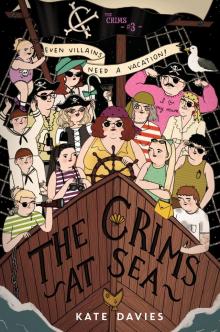 The Crims #3
The Crims #3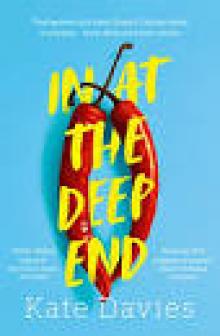 In at the Deep End
In at the Deep End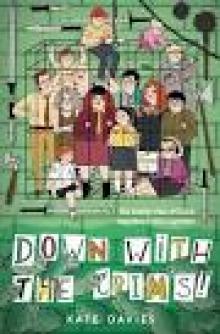 The Crims #2
The Crims #2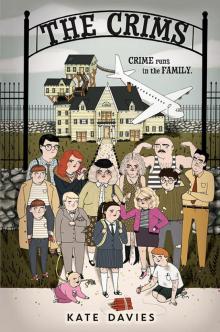 The Crims
The Crims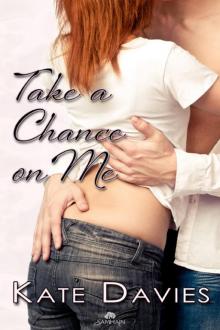 Take a Chance on Me: Lessons, Book 4
Take a Chance on Me: Lessons, Book 4